Creating an Innovation Revolution in India
Changemakers from schools across India came together in Bangalore to reimagine public higher education.
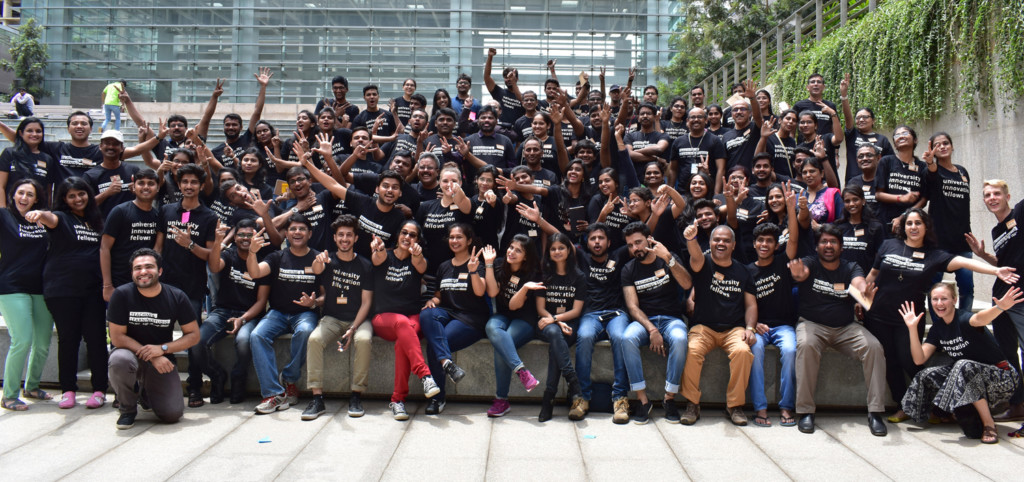
When our program partnered with Google’s India developer training initiative, we knew that this collaboration would mean multiple trips abroad to understand the higher education system there. We never could have imagined that this would lead to our team standing in Bangalore’s beautiful coworking space CoWrks, surrounded by students and faculty whose mission was to lob hundreds of paper airplanes directly at us.
It felt like a one-sided snowball fight, but this was actually an exercise to understand how iterating through many prototypes relates to a project’s success. Several program team members bravely stood in front of the firing line to determine which paper airplanes flew the required distance and which did not (direct body hits to judges were not encouraged, but not disqualified).
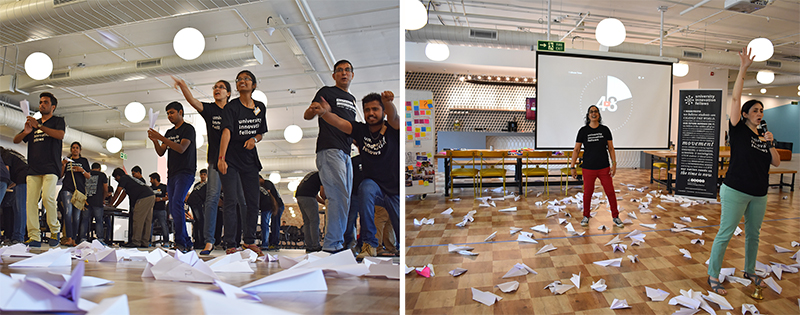
(Left) Attendees test their paper airplanes; (Right) teaching team members judge which airplanes pass the test.
The scene afterwards — paper airplanes swept into a pile, laughter from every corner of the room, teams of faculty and students high-fiving one another — looked more like a playground than a workshop. But this was not a conventional workshop, and these were not conventional participants. They are the faculty and students who are leading an innovation revolution in India’s higher education system.
The event took place in Bangalore, June 21-24, 2017, and combined a workshop for 45 higher education faculty and administrators, called the Teaching and Learning Studio, with a gathering of 55 University Innovation Fellows from across India. The teaching team was comprised of five University Innovation Fellows team members and four colleagues from Stanford’s d.school, the University of Maryland and Clemson University.
The workshop helped faculty understand design thinking and incorporate it into their teaching practices. To do this, they took part in a multi-day design challenge exploring the question ”How might we help women succeed in the technology workforce?” They interviewed local women who worked in technology fields, identified challenges and prototyped solutions. On the third day of the workshop, University Innovation Fellows joined the faculty, and the group took part in sessions on empathy, team building and collaborative campus projects. One evening also featured inspirational talks from young local entrepreneurs and several faculty and Fellows.
Our team was there to learn as much as to teach. Below are just a few insights from our experience.
When passionate students and faculty become allies to create change, amazing things can happen.
This has been a core belief of ours since we started this program five years ago, and it was definitely reaffirmed with this group. We observed some great strides in empathy work during the event, as students and faculty shared challenges and wishes during group discussions, and worked together on projects for their respective schools.
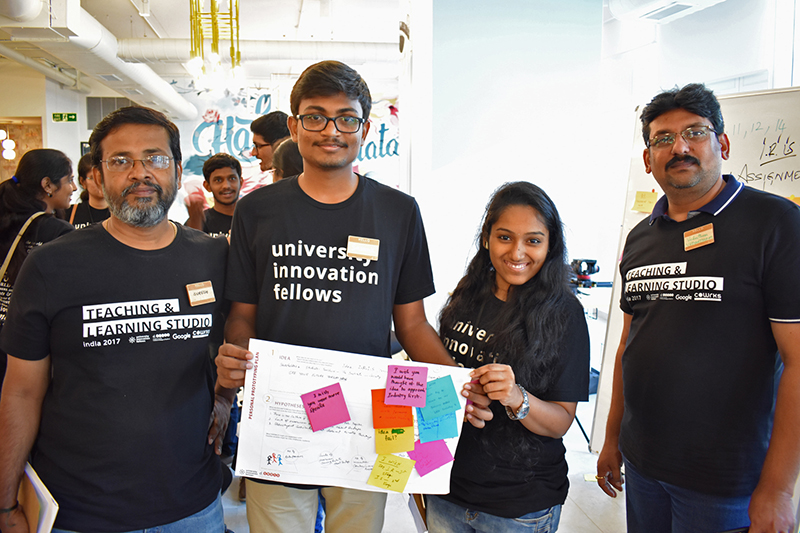
A team of Fellows and faculty members collaborate on a campus project.
Fellows in India have been working to improve the conditions needed to support innovation and entrepreneurship in higher education. The concept of students as change agents is fairly new in India, but Fellows have been encouraged by their campus leadership. They have met with success holding workshops, creating makerspaces, and working on projects such as enabling seamless wifi across their campuses.
Speaking from their experience as change agents, Fellows were asked to give faculty candid feedback about the factors that are impeding innovation, such as the little latitude students have in setting their own schedule, pursuing extra-curricular projects and choosing their own course of study. Students expressed that they feel as though they are between “a rock and a hard place” with pressure from their parents to focus on the highest marks, while hearing from industry that experience working with teams on real-world projects is a bare minimum necessity for entry-level employees. Yet, there’s little wiggle room in today’s constrained academic requirements to allow students to learn these much needed skills.
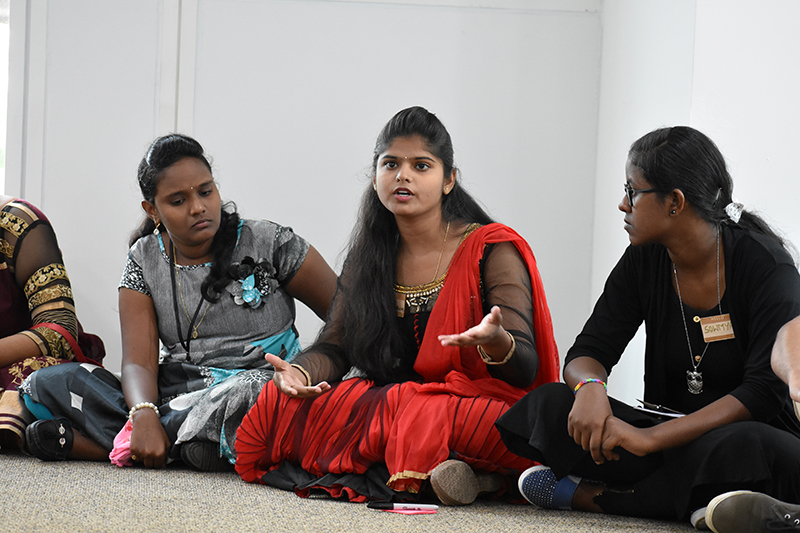
Fellows describe their challenges during an empathy exercise.
For their part, faculty were heartened to see that student initiative could support their own efforts of convincing campus leadership to embrace change. They spoke about the challenges of being a non-autonomous institution with governing bodies requiring adherence to curricular and academic guidelines.
In order to envision new possibilities, we have to challenge our assumptions and adopt an open mindset.
During the workshop, we heard several versions of this statement, including “to learn, you must unlearn,” and “you have to empty the glass before you fill it.” During their design challenge, faculty were asked to make explicit their assumptions connected to the challenge. They were then able to gather information to support or challenge those assumptions by interviewing women working in the tech field.
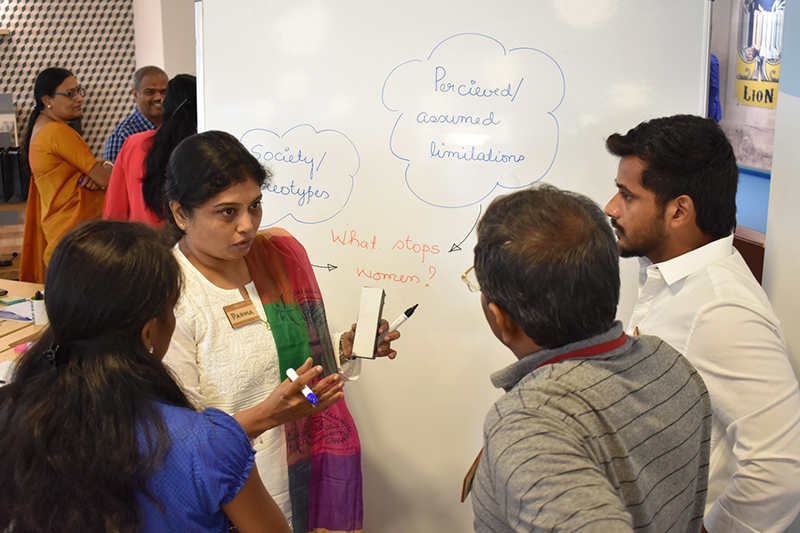
Faculty members list assumptions in the beginning of their design challenge.
This exercise shouldn’t be limited to design challenges; when we’re trying to solve a problem, especially as a team, it’s valuable to spend time identifying our assumptions about both the problem and the possible solutions. Doing so helps us empty our “glass” of all of our preconceived notions about what’s possible.
It’s also important to adopt an open mindset in order to explore new possibilities. One exercise we facilitated with this group to demonstrate this is “Yes, let’s!” We ask for group members to shout out actions, such as “Let’s do jumping jacks” or “Let’s lie down and look at the stars.” Then the group responds “Yes, let’s!” and role-plays whatever was proposed. This activity helps participants free themselves from judging and immediately rejecting anything that is new and unfamiliar. In order to innovate, it’s necessary to consider and explore novel possibilities even when they may seem outlandish at the beginning.
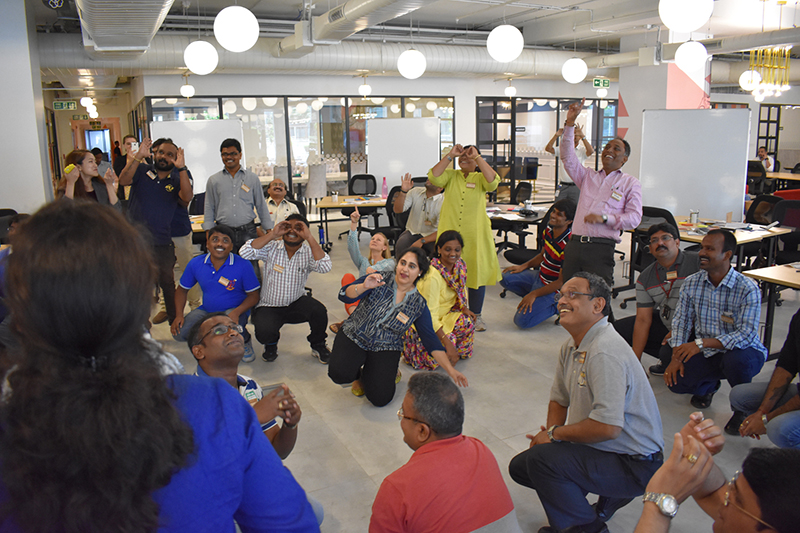
Faculty members take part in the “Yes, let’s!” role-playing activity.
A community of like-minded peers is an immensely valuable resource.
As our program continues to expand to new schools and countries, we’ve come across a huge variety of challenges on each campus that require unique and innovative solutions. However, the one thing that all of these schools share is a few (or more!) passionate students and faculty who are dedicated to improving their schools and helping others.
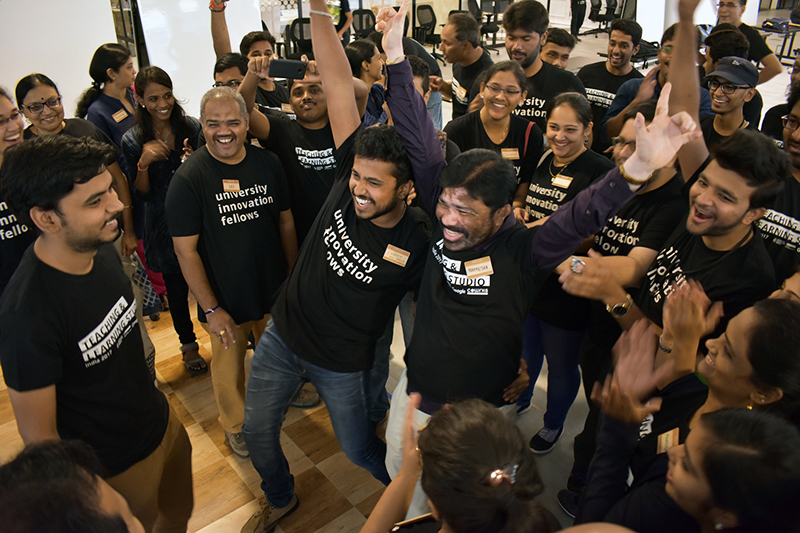
Fellows and faculty take part in a tournament-style “Rock, Paper, Scissors” competition.
Members of our UIF community have reported that a key ingredient for success has been belonging to a community of like-minded peers on their campus. Strong allies have the potential to become collaborators, mentors, champions and resource providers. These allies can be both faculty and students, and can come from places including outside their home department and even their schools.
When you find your community, keep one another motivated and inspired, celebrate one another’s successes, and help one another learn from failures. As Fellow Sai Karan from MITS said in his talk during the workshop, “It’s not about getting inspired. It’s about staying inspired. How do you do that? You inspire others.”
There’s more than one way to throw a paper airplane.
Sure, you can pinch an airplane in between your thumb and forefinger, arc your arm back, and toss. Do you know about the two-handed fling? Many of the planes that passed the finish line were thrown like this….
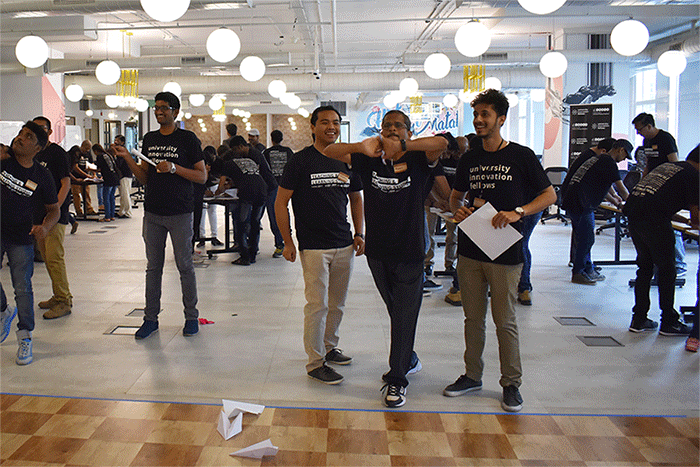
Of course there’s a metaphor here. Even if we think we know how something is supposed to be done, there are always new ways, and there will always be people with new perspectives who can help us open up a world of possibilities.
– The UIF team
We are incredibly thankful to Google for giving us the opportunity to work with amazing change agents in India, and to CoWrks for providing their incredibly versatile space for our workshop and taking such good care of us and our participants.

(Left) The CoWrks event team; (Right) The workshop teaching team
Participating schools:
Alpha College of Engineering
Andhra Pradesh State Skill Development Corporation (APSSDC)
CMR Institute of Technology
Dayananda Sagar College of Engineering
Dhanekula Institute of Engineering and Technology
Galgotias College of Engineering and Technology
Galgotias University
Godavari Institute of Engineering and Technology
Google
IIIT – R K Valley
IIIT – Nuzvid
Institute of Management and Technology (IMT)
JNTUK
KKR & KSR Institute of Technology and Sciences
KLS Gogte Institute of Technology
Madanapalle Institute of Technology & Science
Malnad College of Engineering
Mount Carmel College
NMAM Institute of Technology
P.E.S. Institute of Technology (PESIT)
R V College of Engineering
RVR & JC College of Engineering
Sagi Rama Krishnam Raju Engineering College
Shri Shirdi Sai Institute of Science and Engineering
Siddharth Institute of Engineering and Technology
Sri Padmavathi Mahila Vishwavidyalaya
St. Mary’s Groups of Institutions
Vasireddy Venkatadri Institute of Technology
Visvesveraya Technological University




Leave a Reply
Want to join the discussion?Feel free to contribute!